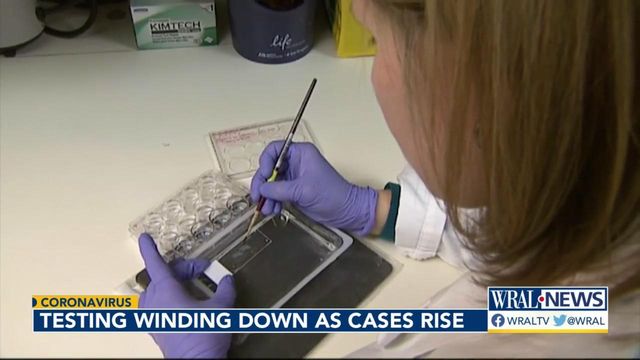North Carolina COVID-19 cases could be 7 to 10 times higher than official data shows
Wake County is in the process of scaling down its COVID-19 testing sites due to a lack of funding.
The last day of the county’s drive-through testing sites is July 29.
State data released Wednesday shows there's been a 9% increase this week in people hospitalized with COVID-19 compared to the previous week.
Duke University Medical Center Dr. David Montefiori said there is likely a lot more spread of COVID-19 than what the state is reporting.
“The real numbers could be 7-10 times higher because of all the unreported cases,” Montefiori said.
Montefiori explained the change in testing is responsible in part for the divergence between the actual number of positive COVID-19 cases and what’s reported by the state.
“It is difficult to get accurate numbers on the daily and weekly infection rates because a lot of people are home testing now,” Montefiori said.
With the closure of many Wake County testing sites at the end of the month, county leaders pointed to the other testing options available. For example, the federal government is providing eight free tests to anyone who fills out an online form. Private entities, including Radeas Labs in Wake Forest and United Providers of Health sites in Raleigh and Apex, continue to offer tests, but most ask that people register for a time slot first.
Montefiori said it is important for health leaders to continue to track the virus closely.
“We need to be very diligent in continuing to monitor, continuing to test to see where this is going so we can understand what needs to be done to bring an end to the pandemic,” Montefiori said.
BA.5 is the dominant COVID variant that spreading right now. There is reason to believe it can get around antibodies created by vaccines for protection, particularly in those who have not had a recent booster.
However, Montefiori said it was too soon for early clinical data to show how vaccines are holding up against the newest variant.
In South Africa, cases of omicron BA.5 are decreasing. The country had a spike in hospitalizations and deaths, but not nearly as bad as it was with previous variants.
Montefiori said getting the vaccine and getting boosted is still very important to prevent someone from getting seriously ill if they get infected.
“I don’t think we should be completely back to normal yet,” Montefiori said.
Montefiori said he does not expect the number of infections from BA.5 to be as high as previous variants.
“This is an indication we are finally building up a level of population immunity from people getting vaccinated or recovering from infection or a combination of both, and that immunity is protecting people from serious illness and hospitalization and death,” Montefiori said.











